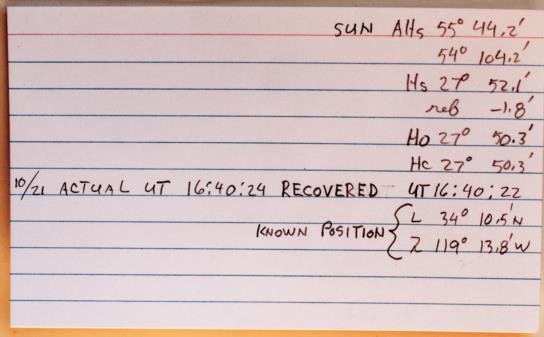
NavList:
A Community Devoted to the Preservation and Practice of Celestial Navigation and Other Methods of Traditional Wayfinding
Re: Resetting your clock at a known location
From: Greg Rudzinski
Date: 2015 Oct 21, 15:00 -0700
From: Greg Rudzinski
Date: 2015 Oct 21, 15:00 -0700
Bruce,
This morning I did a time recovery by Sun observation using an artificial horizon. The actual time of observation was compare to recovered time by using UT trials on a phone app until a zero intercept was obtained between Ho and Hc. Got within 2 seconds of actual UT time so I would say that using an artificial horizon on land is the way to go. The next best way would be observations from a known position at anchor using a natural horizon. If at sea in a small craft the recoverd time will be degraded by DR uncertainty and +/- 3nm on The CN observation.
Greg Rudzinski
From: Bruce J. Pennino
Date: 2015 Oct 21, 09:15 -0400Hello:Since we are “talking” historically, I have a question regarding resetting your clock when at a known location (or with a excellent fix , say from stars). This is discussed by Letcher & Karl.Background: In August, a couple of hours before sunset when the sun was about due west, I pretended I did not know my time. I recorded an ordinary set of sights....really no special pains taken. Knowing my location, by initially guessing a time ( I knew it was a couple of hours before sunset) I quickly calculated my actual time. I recollect it was in error by a minute or less. If I did it again the next day, I suspect I could eventually get to 15 or 20 seconds error. Did mariners in the 1800s do this? So much easier than lunars and it can be done with any celestial body. This is nothing but a bit more than a “time sight” with some tabular interpolation. Anyone done this? How accurate was your time when at a known position? Karl’s method of interpolation is straight forward.Just curious.
Bruce







